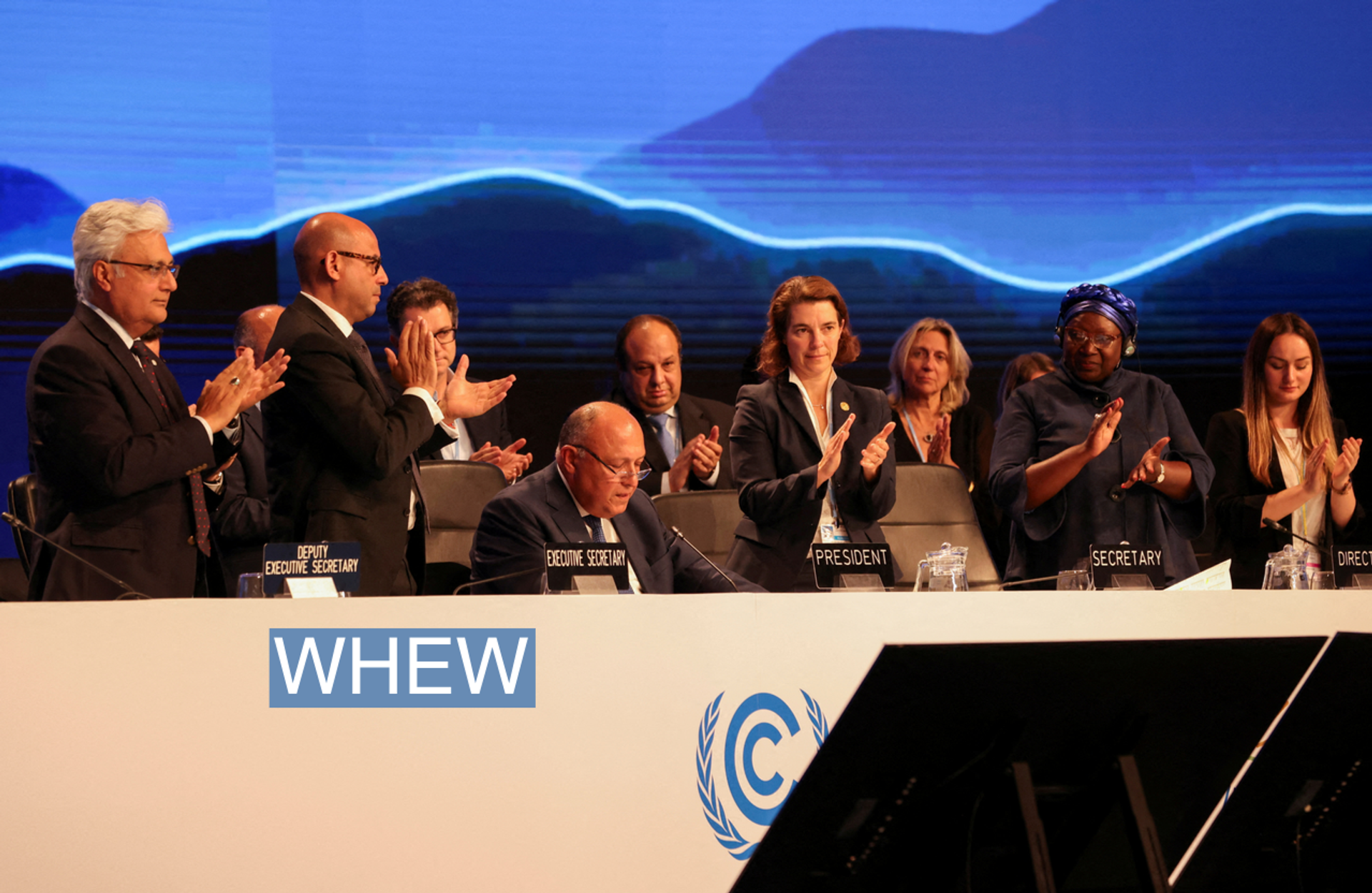The News
Sharm El-Sheikh, Egypt — Developed countries at a global climate conference agreed to establish a fund to compensate the most vulnerable nations for some future climate-induced damages, a major concession they hope will allow talks to refocus on cutting greenhouse gas emissions.
The deal was the main outcome of COP27 that ended today in Sharm El-Sheikh, Egypt, after two extra days of prolonged and sometimes angry negotiations. The agreement to establish the fund — whose size, exact donors and recipients and start date all remain to be determined — allowed the conference to end without breaking down, with all countries signing on as required.
When the Egyptian government, a close ally of Saudi Arabia and overseer of the negotiations, declined to put the fossil fuel phase-out up for formal consideration, the European Union backed off threats to walk away from the conference, saying the establishment of the climate damage fund was critical.
The pact on so-called “loss and damage” funding, indirect acknowledgment that developing countries are suffering from the consequences of greenhouse gasses caused by the developed world, was one of the few bright spots of a gathering that delivered little in terms of broadly raising ambitions to cut greenhouse gas emissions compared to last year’s conference in Glasgow, Scotland.
The main effort to ramp up ambitions — a call to expand last years’ focus on ending the use of coal to include all fossil fuels — ended with only a repeat-mention of phasing out coal and fossil fuel subsidies.
That partly reflected the influence of oil-and-gas producers, including the United States, who rejected a proposal to phase out all fossil fuels. Industry critics denounced the more than 160 oil and gas industry representatives attending the conference, up about 50% from Glasgow.
Oil and gas producing countries fared much better here than they did at last year’s in Glasgow. There, before the war in Ukraine and the global energy crisis it spurred, a hard-charging U.K. host allied itself with a Europe confident it was progressing smoothly towards clean energy. They all but banished petro-states and big oil and gas companies.
All that changed in Egypt, which cut gas deals on the sidelines of the gathering and is financially dependent on Persian Gulf oil states Saudi Arabia and the United Arab Emirates. The Saudis had the second-largest pavilion, behind the host itself. The United Arab Emirates, which will host the next climate conference, COP28, sported the largest delegation.

In this article:
Bill’s view
The summit accomplished the bare minimum required to keep the Paris Agreement of 2015 alive, despite a major United Nations report released ahead of it saying a colossal step-up in efforts is necessary to head off many of the worst impacts of global warming. Even the success in agreeing to put together a fund won’t quell growing tensions between developing and developed countries over rising climate damages
More arguments lay ahead over which countries will qualify for funds and whether once-developing China, now by far the world’s biggest greenhouse gas emitter, will contribute. What exactly qualifies as climate damage is also unclear. And the conference didn’t even attempt to answer the all-important issue of how much money will ultimately flow.
The world simply hasn’t come to terms with how to finance either the massive global energy transition that must take place in the coming decades or pay for the increasingly costly damage climate change is causing. The bill for both of those tasks will run into the trillions of dollars, though the energy transition costs are investments that will pay massive dividends over time.
U.S. climate envoy John Kerry spent much of the 16-day conference proposing different ways that massive pools of private funds could be mobilized. His efforts were hamstrung in the final days of the conference when he was confined to his hotel room with COVID-19, a big setback for the affable climate warrior who was likely attending his final global climate summit as a special presidential envoy. In the end, there were no breakthroughs on how to scale finance to anywhere near what’s needed.
Room for Disagreement
One glimmer of hope was the restart of formal talks between the climate envoys for the U.S. and China, which were halted after U.S. House Speaker Nancy Pelosi visited Taiwan in August. A meeting between President Joe Biden and Chinese counterpart Xi Jinping at the G20 helped ease tensions, paving the way for the resumption of climate negotiations.
Still, differences remain. China has historically been classified as a developing country in climate negotiations, and refused to consider any change to that, despite having grown into the world’s second-largest economy since the classifications were made.
The View From Abu Dhabi
COP28, even more than this year’s summit, will inevitably turn on what role oil and gas will play in an energy transition.
The United Arab Emirates has been among the world’s biggest advocates of renewable energy, as well. Abu Dhabi has built the world’s largest single-site solar farm and is one of the world’s biggest global investors in renewable projects. In a world increasingly enamored with green hydrogen as the clean fuel of the future, Saudi is the only country to have exported cargoes of ammonia produced by clean hydrogen in a pilot project with Japan.
Both countries, as well as the U.S. as the world’s largest producer and consumer of fossil fuels, are investing heavily in technologies that remove carbon from fossil fueled processes, as well as directly from the atmosphere.
So the question for COP28 will likely become whether the goal is phasing out the current sources of greenhouse gasses, or merely the emissions, if that’s even possible.